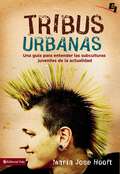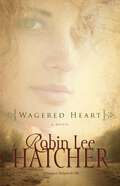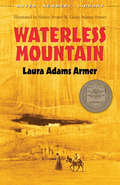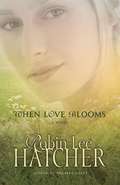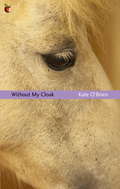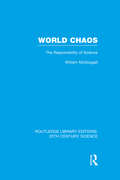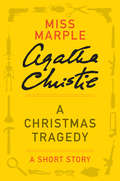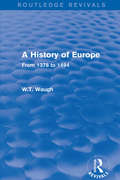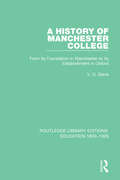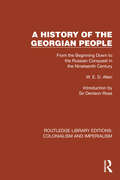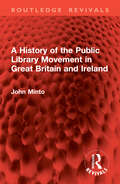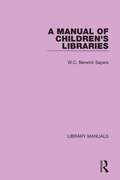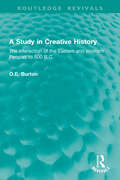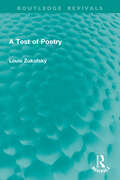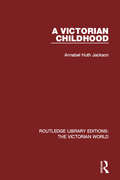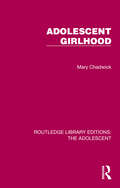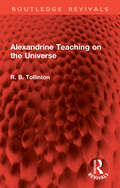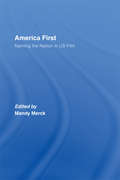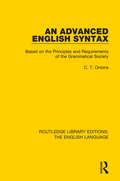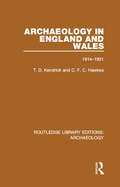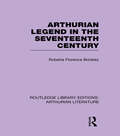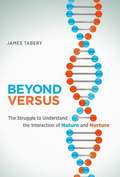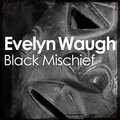- Table View
- List View
Urban Tribes: Una guía para entender las subculturas juveniles de la actualidad (Especialidades Juveniles)
by María José HooftA book for youth pastors, pastors, parents and young people who are looking for first-hand information regarding how the members of urban groups function and think. You will learn how they are established and what internal and external agents help their formation. You will be able to develop an urban theology which will reach these people with the love of Christ. This is a necessary tool for working with young people today.
Wagered Heart
by Robin Lee HatcherBethany Silverton can't resist the challenge of charming a rough cowboy. But when she makes an innocent wager, unexpected results could turn a little flirtation into a lifetime of love. A sheltered preacher's daughter stakes her heart on love in this action-filled romance in the wild west of 1880s Montana.
Waterless Mountain
by Laura Adams Armer Sidney ArmerYounger Brother lives in a dry land, and he dreams of finding the wide water of the Pacific Ocean. This gentle coming-of-age story, rooted in the traditional culture of the Navajo, recounts Younger Brother's journey toward finding his vocation as a medicine man. Under the guidance of his uncle, the boy learns about the ancient songs, customs, and ceremonies of his people as well as the modern-day magic of movies and airplanes.Written in the 1930s by an authority on Native American life and lore, this Newbery Medal winner offers a vivid portrait of Navajo beliefs and traditions. Its simple but poetic storytelling style is enhanced by numerous black-and-white illustrations.
When Love Blooms
by Robin Lee HatcherWhen Emily Harris takes a job in the rugged high country of Idaho, she's about to discover that changing the heart of one man may be the destiny she's been in search of all her life. A heartwarming historical romance by bestselling author Robin Lee Hatcher.
Without My Cloak (Virago Modern Classics #298)
by Kate O'BrienWhen Anthony Considine creeps into Mellick town with a stolen horse in 1789, it sets the destiny of his family for decades to come. By the 1850s, through thrift and hard work, his son Honest John has made the Considines a leading Mellick family. With his father's money, John's son Anthony builds a grand country house for his wife and children - but especially for his youngest son Denis, who he adores, little knowing that one day Denis will threaten the toil of generations with his love for a peasant girl . . .
Without My Cloak (Virago Modern Classics #478)
by Kate O'BrienWhen Anthony Considine creeps into Mellick town with a stolen horse in 1789, it sets the destiny of his family for decades to come. By the 1850s, through thrift and hard work, his son Honest John has made the Considines a leading Mellick family. With his father's money, John's son Anthony builds a grand country house for his wife and children - but especially for his youngest son Denis, who he adores, little knowing that one day Denis will threaten the toil of generations with his love for a peasant girl . . .
World Chaos: The Responsibility of Science (Routledge Library Editions: 20th Century Science)
by William McDougallThis book, first published 1931, examines the attitudes surrounding the natural sciences at the time of writing, and contends that an unreflective belief in the power of science, and especially in humanity’s capacity to turn such knowledge to noble ends, could lead to catastrophic results for human civilisation. Commenting on the forced industrialisation in Russia, India and China that was proceeding with little regard for human life at the time, the unsustainable inequality generated by modern Western capitalism and many other related issues, the author argues that it is necessary to devote the same energy to the resolution of social problems as to scientific research and development. His thesis, though expounded with reference to concrete situation different from our own, is nonetheless as relevant today as it was when first published.
A Christmas Tragedy: A Miss Marple Story
by Agatha ChristieAt a health resort, Miss Marple becomes suspicious that a man she meets is planning on murdering his wife. Previously published in the print anthology The Thirteen Problems.
A History of Europe: From 1378 to 1494
by W.T. WaughFirst published in 1932, this book looks at a period that has often been thought of as a time of general decline in the most characteristic features of medieval civilisation. While acknowledging decline in many areas during this period — the power of the Church, feudalism, guilds, the Hanseatic League, the autonomy of towns and the end of the two Roman empires — the author argues that there was also signs of development. National consciousness, the power of the bourgeoisie and trade and industry all rose markedly in this period alongside intellectual and artistic achievements outside of Italy. This book asserts that in amongst the failure and decline new forces were creating new substitutes.
A History of Manchester College: From its Foundation in Manchester to its Establishment in Oxford (Routledge Library Editions: Education 1800-1926 #3)
by V. D. DavisThis book, first published in 1932, tells the progress of Manchester College, founded in Manchester in 1786, and since 1889 established at Oxford, as a postgraduate School of Theology and place of training for the ministry of religion. This title will be of interest to students of history and education.
A History of the Georgian People: From the Beginning Down to the Russian Conquest in the Nineteenth Century (Routledge Library Editions: Colonialism and Imperialism #2)
by W.E.D. AllenA History of the Georgian People (1971) begins with an account of the early history and ethnographic background of Georgia, and goes on to cover the country’s political history from 1000 to 1800 and Russian conquest. There are chapters on the social history of the country, with much interesting information on the feudal system, religion, justice and the slave trade. The final, illustrated section, discusses the art and literature of the Georgians.
A History of the Public Library Movement in Great Britain and Ireland (Routledge Revivals)
by John MintoOriginally published in 1932, A History of the Public Library Movement in Great Britain and Ireland is concerned with the rise and progress of the public library as it stood at that time. The establishment and growth of the public library may be viewed as part of the great social movement for the spread of knowledge among the poorer classes which took place in the late eighteenth century and the early years of the nineteenth century. This movement was characterized by the establishment of various educational agencies, which are covered in this book, along with the introduction of the Public Libraries Act passed in 1850 and other legislation that followed.
A Manual of Children's Libraries (Library Manuals #11)
by W.C. Berwick SayersThis book, first published in 1932, is a guide to the details required of a successful children’s library, not just the books and catalogue, but also the different staffing needs of a collection aimed purely at children.
A Study in Creative History: The Interaction of the Eastern and Western Peoples to 500 B.C. (Routledge Revivals)
by O.E. BurtonA Study in Creative History (1932) aims to present the main movements of thought as they emerge clearly into history. The book offers the view that the main developments prior to 500 B.C. were the emergence of the Prophetic school in Israel, of Mazdaism in Persia, of Brahmanism, Buddhism in India and Confucianism in China.
A Test of Poetry (Routledge Revivals)
by Louis ZukofskyA Test of Poetry (1932) is a comparative study of poetry from Homer to the twentieth century. By giving several translations of the same passage from Homer, an elegy of Ovid and lines from Herrick which read like an adaptation of Ovid, or a fifteenth century poem about a cock and a recent poem about chickens, and so on, a means for judging the values of poetic writing is established. The book also has a comparative chronological chart, including a summary of critical views.
A Victorian Childhood (Routledge Library Editions: The Victorian World #29)
by Annabel Huth JacksonFirst published in 1932. This title is a first-person account of growing up in Victorian England. The book examines many aspects of the British Empire, and the family life and education of the poet, writer and high society hostess Claire Annabel Caroline Grant Duff. A Victorian Childhood will be of interest to students of history.
Adolescent Girlhood (Routledge Library Editions: The Adolescent)
by Mary ChadwickOriginally published in 1932, Adolescent Girlhood set out to give a general view of the more everyday problems a girl might encounter during adolescence. Both at home and at school and those problems that had, despite their prevalence, not gained as much attention or understanding as they merited or required. It was assumed that readers interested in development would have had some knowledge of the general concepts of psychology and psychoanalysis, given the prominence of discoveries in these fields over the previous ten to twenty years. <p><p> It starts with some history of the adolescent girl, including their representation in literature and goes on to cover issues such as physical changes, as well as psychological and emotional expectations. Today it can be read and enjoyed in its historical context. <p><p> This book is a reissue first published in 1932. The language used is a reflection of its era and no offence is meant by the Publishers to any reader by this re-publication.
Alexandrine Teaching on the Universe (Routledge Revivals)
by R. B. TollintonOriginally published in 1932, this book is based on a series of lectures delivered in Cambridge in 1931. The views of the universe as held by the great teachers of Ancient Alexandria are discussed: Philo, Clement, Origen, Plotinus and the Gnostics are considered and their outlook compared and contrasted with certain phases of early 20th Century scientific opinion..
America First: Naming the Nation in US Film
by Mandy MerckAt a time when the expanded projection of US political, military, economic and cultural power draws intensified global concern, understanding how that country understands itself seems more important than ever. This collection of new critical essays tackles this old problem in a new way, by examining some of the hundreds of US films that announce themselves as titularly 'American'. From early travelogues to contemporary comedies, national nomination has been an abiding characteristic of American motion pictures, heading the work of Porter, Guy-Blaché, DeMille, Capra, Sternberg, Vidor, Minnelli and Mankiewicz. More recently, George Lucas, Paul Schrader, John Landis and Edward James Olmos have made their own contributions to Hollywood’s Americana. What does this national branding signify? Which versions of Americanism are valorized, and which marginalized or excluded? Out of which social and historical contexts do they emerge, and for and by whom are they constructed? Edited by Mandy Merck, the collection contains detailed analyses of such films as The Vanishing American, American Madness, An American in Paris, American Graffiti, American Gigolo, American Pie and many more.
An Advanced English Syntax: Based on the Principles and Requirements of the Grammatical Society (Routledge Library Editions: The English Language #20)
by C. T. OnionsThis book, first published in 1970, is the reissue of the sixth edition of C. T. Onions’ standard introductory text-book, based on the principles and requirements of the Grammatical Society. The Introduction is designed to provide a full scheme of sentence analysis. The rest of the book is arranged in two parts: Part I offers a treatment of syntactical phenomena based on the analysis of sentences, while Part II classifies the use of forms. This book will be of interest to students of English language and linguistics.
Angus Lost (Angus and the Cat #3)
by Marjorie FlackAlways curious, Angus runs away from his house to seek new adventures. Find them he does, but will Angus make it back home? Find out in the third book in Marjorie Flack's lovable picture book series, Angus Lost. "Delightful in text and pictures." --Chicago Daily Tribune
Archaeology in England and Wales 1914 - 1931 (Routledge Library Editions: Archaeology)
by C.F.C. Hawkes T.D. KendrickThis survey of work carried out over a number of years synthesises the progress of archaeology, showing at a glance the changes within less than quarter of a century on the interpretation of and reflection on knowledge in the area. Entertainingly, written, this is a lasting introductory account of important finds in English and Welsh archaeology, by two of the key researchers of the time. Heavily illustrated, this book showcases many artefacts as well as maps and plans, offering a wealth of information.
Arthurian Legend in the Seventeenth Century (Routledge Library Editions: Arthurian Literature)
by Roberta Florence BrinkleyThe study of the Arthurian legend in the 1600s has revealed almost no romance; the stories are more about the truth of Arthur’s existence and his exploits, with influence due to political bearing of the royalty versus parliament at the time. This fascinating study elucidates the differences between the stories of the seventeenth century and those more well-known now and looks at the development of the literature in line with the political climate and its links with Arthurian prophecy and lineage. Originally published 1932 and again in 1967.
Beyond Versus
by James TaberyIf everyone now agrees that human traits arise not from nature or nurture but from the interaction of nature and nurture, why does the "nature versus nurture" debate persist? In Beyond Versus, James Tabery argues that the persistence stems from a century-long struggle to understand the interaction of nature and nurture -- a struggle to define what the interaction of nature and nurture is, how it should be investigated, and what counts as evidence for it. Tabery examines past episodes in the nature versus nurture debates, offers a contemporary philosophical perspective on them, and considers the future of research on the interaction of nature and nurture. From the eugenics controversy of the 1930s and the race and IQ controversy of the 1970s to the twenty-first-century debate over the causes of depression, Tabery argues, the polarization in these discussions can be attributed to what he calls an "explanatory divide" -- a disagreement over how explanation works in science, which in turn has created two very different concepts of interaction. Drawing on recent developments in the philosophy of science, Tabery offers a way to bridge this explanatory divide and these different concepts integratively. Looking to the future, Tabery evaluates the ethical issues that surround genetic testing for genes implicated in interactions of nature and nurture, pointing to what the future does (and does not) hold for a science that continues to make headlines and raise controversy.
Black Mischief
by Evelyn WaughBlack Mischief, " Waugh's third novel, helped to establish his reputation as a master satirist. Set on the fictional African island of Azania, the novel chronicles the efforts of Emperor Seth, assisted by the Englishman Basil Seal, to modernize his kingdom. Profound hilarity ensues from the issuance of homemade currency, the staging of a "Birth Control Gala, " the rightful ruler's demise at his own rather long and tiring coronation ceremonies, and a good deal more mischief.
